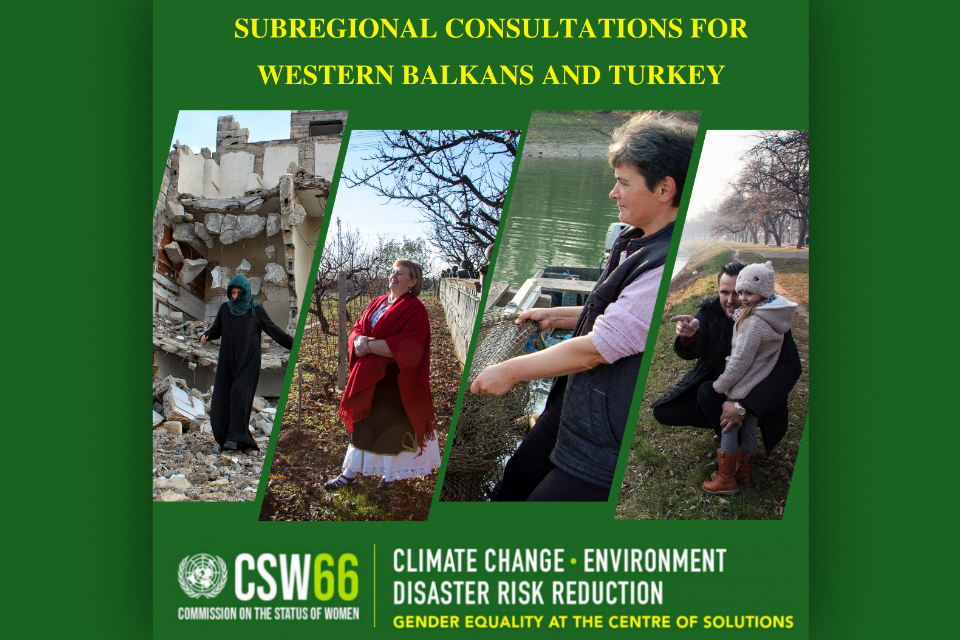Press release: The governments of Western Balkan countries and Turkey discussed the expansion of women's leadership and voice on climate action
Date:

24 February - Today, the Government of Serbia and the UN Women Regional Office for Europe and Central Asia jointly convened the subregional consultations under the theme “Untapped potential: Expanding women's leadership and voice on climate, environmental and disaster risk reduction policies and actions in the Western Balkan countries and Turkey”.
The main objective of the consultations was to support the countries in the Western Balkans and Turkey in jointly developing the key messages for the sub-regional vision, its perspectives, experiences, and recommendations on the game-changing actions in the climate change, environment, and disaster risk reduction arena. The virtual meeting was held within a series of subregional consultations in the Europe and Central Asia region as part of preparations for the sixty-sixth session of the Commission on the Status of Women (CSW66).
The consultations gathered representatives of national gender equality machineries, environment management and disaster risk reduction institutions, parliaments, civil society organizations, youth representatives, gender experts, national UN Framework Convention on Climate Change coordinators, the Regional Coordination Council members, as well as representatives of the international community, research centers and think tanks.
“Climate change affects women disproportionately due to their limited access to resources and underrepresentation in decision-making,” said Gordana Gavrilović, Gender Equality Advisor to the Deputy Prime Minister and President of the Coordination Body for Gender Equality, Serbia. “Gender-just transition is essential for clean energy, protecting the environment, and challenging people’s perception of energy as a male-dominated sector.”
In the region, women comprise the majority of those who work in agriculture, which makes them particularly exposed to climate change and uneven labour opportunities. Yet their voices are woefully under-represented when it comes to making climate decisions. The average representation of women in national and global climate negotiating bodies across Europe and Central Asia is below 30 per cent. In 2019 women comprised 20,8% of ministers responsible for the environment, transport and energy in Western Balkan countries and Turkey.
Gendered drivers and impacts of environmental degradation and climate change amplify existing gender inequalities. In many contexts, women’s dependence on and unequal access to the environment – land, water, and other natural resources – and public services and infrastructure, including energy, transport, water, and sanitation, meaning that they are disproportionately affected by climate change, environmental degradation, and disasters. Further, women’s unpaid care and domestic workloads intensify due to the outmigration of men, or when women and their families are obliged to seek alternative livelihoods or migrate because of devastating environmental and climate impacts or disasters on livelihoods and income security.“It is critical to invest in ecofeminist movements and organizations, as well as youth-led movements, to resolve the climate crisis and create more just societies,” added Tijana Ljubenović, a Project Coordinator at NGO "Young Researchers of Serbia”, Serbia.
About 83% of primary energy use in Western Balkans comes from fossil fuels. Emissions from the 16 thermal power plants in Western Balkans exceed emissions of the 250 coal power plants located within the European Union territory. Total SO2 emissions from thermal power plants in the Western Balkans were 2.5 times higher than total emissions from all thermal power plants in the EU. The population of the Western Balkans is exposed to some of the highest concentrations of air pollution in Europe. In 2019, due to air pollution the region suffered 30.760 premature deaths.
“Climate change is a global security threat and an economic imperative. Women must have a say in the matter,” said Bojana Zorić, Senior Policy Analyst, Regional Cooperation Council.
As a result of the gathering, the UN Women Regional Office for Europe and Central Asia will develop a summary of the key recommendations from Western Balkan countries and Turkey. The recommendations will feed into the CSW66 and inform membership contributions to the Agreed Conclusions.
For more information, please contact Meriza Emilbekova, Communications and Outreach Specialist, UN Women Regional Office for Europe and Central Asia, at [ Click to reveal ].